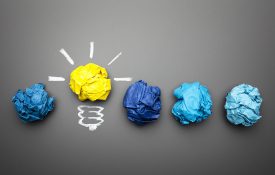-
Thirteen in Years, but 10 or 15 in Thoughts and Action
The New York Times: Gather together a random assortment of 13-year-olds, and you’ll likely find yourself looking at a group of people who have only their age in common. Some will be way into teenage culture, into hanging out and hooking up, even into alcohol and drugs; others will be little changed from the children they were at 12, 11, even 10 years of age, still singing the songs and playing the games of children. The wide spread in young people’s rates of social and psychological maturation has led some researchers to propose that we think about adolescents not just in terms of their chronological age, but also their subjective age: how old they feel and act.
-

Observation Skills May be Key Ingredient to Creativity
University of Amsterdam researchers explored whether there could be a link between various aspects of mindfulness and aspects of creative thinking.
-
Insecurity at the Borderline
Republican Senator Thad Cochran, who has represented Mississippi since 1978, this week used a clever psychological strategy to fend off a primary challenge from the right wing of the party. “The Tea Party,” he confessed on a final campaign swing, “is something I don’t really know a lot about.” Nobody believes that. Cochran hasn’t been living in a cave. What he was doing, very effectively, was marginalizing his Tea Party rival, playing on the insecurities of a GOP “fringe” faction within the party’s establishment. And his opponent took the bait, reacting with hostility toward the powerful incumbent and behaving ungraciously in defeat.
-
Where’s The Line Between Cheating A Little and Cheating A Lot?
NPR: Behavioral economist Dan Ariely explains the hidden reasons we think it's okay to cheat or steal. He says we're predictably irrational — and can be influenced in ways we don't even realize. Listen to the whole story: NPR
-
Studying Human-Computer Interaction at Microsoft Research
Science Magazine: At most scientific conferences, almost every nametag you see dangling from people's necks shows a university title. But this wasn't the case for many people wandering the halls last month at the annual meeting of the Association for Psychological Science (APS). Many of those tags featured names like Google, Microsoft, Facebook, and other tech giants. It’s a sign of the times: Social scientists are getting snatched up by tech companies. Mary Czerwinski is a cognitive psychologist based at Microsoft Research (MSR) in Redmond, Washington. Czerwinski earned a Ph.D.
-
The Fault in Our Stars
The Wall Street Journal: World Cup fans, take note: If your team loses, the problem may be too much talent. Of course, teams benefit from great players. Still, a new study from researchers on both sides of the Atlantic finds that in team-oriented sports like soccer and basketball, too many stars on one team can hurt performance by impairing teamwork. But in baseball—with its emphasis on individual performance by batters, pitchers and fielders—the more stars, the better. The study, by social scientists at Columbia University, France's Insead business school and Amsterdam's VU University, analyzed data from all three sports to tease out the connections among star talent, teamwork and success.

